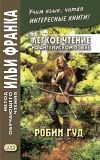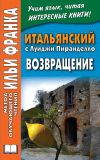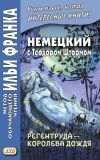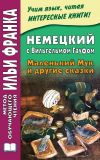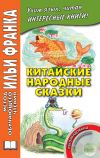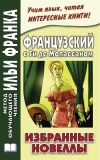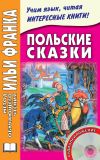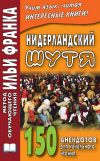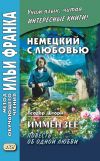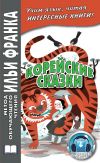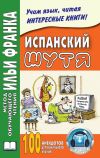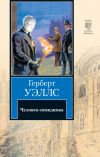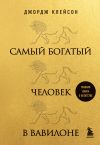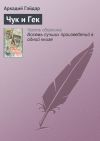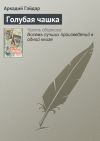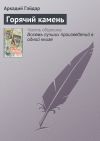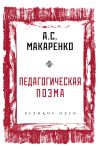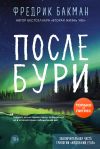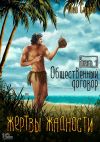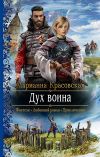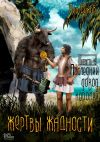Текст книги "Английская коллекция. Уильям Батлер Йейтс. Рассказы о Рыжем Ханрахане / W. B. Yeats. Stories of Red Hanrahan"
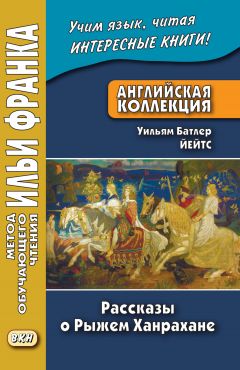
Автор книги: Уильям Йейтс
Жанр: Иностранные языки, Наука и Образование
Возрастные ограничения: +16
сообщить о неприемлемом содержимом
Текущая страница: 8 (всего у книги 9 страниц)
also ['ɔ:lsǝʋ], mirror ['mɪrǝ], downward ['daʋnwǝd]
They came nearer and nearer, and Hanrahan saw that they also were lovers, and that they had heart-shaped mirrors instead of hearts, and they were looking and ever looking on their own faces in one another’s mirrors. They passed on, sinking downward as they passed, and other shapes rose in their place, and these did not keep side by side, but followed after one another, holding out wild beckoning arms, and he saw that those who were followed were women, and as to their heads they were beyond all beauty, but as to their bodies they were but shadows without life, and their long hair was moving and trembling about them, as if it lived with some terrible life of its own.
And then the mist rose of a sudden and hid them (а потом внезапно поднялся туман и скрыл их; of a sudden – внезапно; to hide), and then a light gust of wind blew them away towards the north-east (а затем легкий порыв ветра понес их к северо-востоку; to blow away – уносить воздушным потоком), and covered Hanrahan at the same time with a white wing of cloud (и в это же время накрыл Ханрахана белым облачным крылом).
He stood up trembling and was going to turn away from the valley (он встал, /весь/ дрожа, и собирался отвернуться от долины; to be going to – собираться, намереваться /сделать что-л./), when he saw two dark and half-hidden forms (когда увидел две темные наполовину скрытые фигуры; form – форма, очертание; фигура /человека/) standing as if in the air just beyond the rock (стоящие будто в воздухе прямо за скалой), and one of them that had the sorrowful eyes of a beggar said to him in a woman’s voice (и одна из них, у которой были печальные глаза просящего, сказала ему женским голосом), “Speak to me, for no one in this world or any other world has spoken to me for seven hundred years (поговори со мной, ибо никто ни в этом мире, ни в каком ином мире не говорил со мной на протяжении семисот лет).”
cover ['kʌvǝ], turn [tɜ:n], hundred ['hʌndrǝd]
And then the mist rose of a sudden and hid them, and then a light gust of wind blew them away towards the north-east, and covered Hanrahan at the same time with a white wing of cloud.
He stood up trembling and was going to turn away from the valley, when he saw two dark and half-hidden forms standing as if in the air just beyond the rock, and one of them that had the sorrowful eyes of a beggar said to him in a woman’s voice, “Speak to me, for no one in this world or any other world has spoken to me for seven hundred years.”
“Tell me who are those that have passed by,” said Hanrahan (поведай мне, кто были те, что прошли мимо, – сказал Ханрахан).
“Those that passed first,” the woman said (те, что прошли первыми, – сказала женщина), “are the lovers that had the greatest name in the old times (это влюбленные, которые в старину имели величайшую славу), Blanad and Deirdre and Grania and their dear comrades (Бланайд, Дейрдре, Грания и их милые дружки; dear – дорогой, любимый; comrade – товарищ, компаньон), and a great many that are not so well known but are as well loved (и великое множество других, которые не так известны, но так же любимы). And because it was not only the blossom of youth they were looking for in one another (и потому, что не одно лишь цветение юности они искали друг в друге; to look for – искать), but the beauty that is as lasting as the night and the stars (но и красоту, которая вечна, как ночь и как звезды; lasting – длительный, продолжительный), the night and the stars hold them for ever from the warring and the perishing (ночь и звезды, которые всегда оберегают их от вражды и погибели; to hold – держать; удерживать /от чего-л./;to perish – гибнуть), in spite of the wars and the bitterness their love brought into the world (несмотря на войны и горести, которые их любовь принесла миру).
dear [dɪǝ], youth [ju:θ], bitterness ['bɪtǝnɪs]
“Tell me who are those that have passed by,” said Hanrahan.
“Those that passed first,” the woman said, “are the lovers that had the greatest name in the old times, Blanad and Deirdre and Grania and their dear comrades, and a great many that are not so well known but are as well loved. And because it was not only the blossom of youth they were looking for in one another, but the beauty that is as lasting as the night and the stars, the night and the stars hold them for ever from the warring and the perishing, in spite of the wars and the bitterness their love brought into the world.
And those that came next,” she said (а тех, что шли следующими, – сказала она), “and that still breathe the sweet air and have the mirrors in their hearts (и которые до сих пор дышат свежим воздухом, и у которых зеркала в сердцах; sweet – сладкий; свежий, неиспорченный), are not put in songs by the poets (поэтами не помещены в песни), because they sought only to triumph one over the other (потому что они добиваются лишь превосходства друг над другом; to seek – искать; добиваться; triumph – победа, торжество), and so to prove their strength and beauty (и /стремятся/ таким образом доказать свои силу и красоту), and out of this they made a kind of love (и из этого они создали нечто похожее на любовь; a kind of – своего рода, нечто вроде). And as to the women with shadow-bodies (что же касается женщин с призрачными телами), they desired neither to triumph nor to love but only to be loved (то они не желали ни побеждать, ни любить, а только быть любимыми), and there is no blood in their hearts or in their bodies (и нет крови ни в сердцах их, ни в их телах) until it flows through them from a kiss (если: «пока» только она не потечет в них после поцелуя), and their life is but for a moment (и жизнь их – только лишь мгновение).
breathe [bri:ð], triumph ['traɪǝmf], prove [pru:v]
And those that came next,” she said, “and that still breathe the sweet air and have the mirrors in their hearts, are not put in songs by the poets, because they sought only to triumph one over the other, and so to prove their strength and beauty, and out of this they made a kind of love. And as to the women with shadow-bodies, they desired neither to triumph nor to love but only to be loved, and there is no blood in their hearts or in their bodies until it flows through them from a kiss, and their life is but for a moment.
All these are unhappy, but I am the unhappiest of all, for I am Dervadilla, and this is Dermot (все они несчастны, но я несчастнее всех, ибо я – Дервадилла, а это – Дермот), and it was our sin brought the Norman into Ireland (и это наш грех привел норманнов в Ирландию). And the curses of all the generations are upon us (проклятия всех поколений лежат на нас), and none are punished as we are punished (и никто так не наказан, как наказаны мы). It was but the blossom of the man and of the woman we loved in one another (лишь мужское и женское начало: «цветение» мы любили друг в друге), the dying beauty of the dust and not the everlasting beauty (умирающую красоту тлена, а не вечную красоту; dust – пыль; прах, тлен). When we died there was no lasting unbreakable quiet about us (когда мы умерли, вокруг нас не было вечного нерушимого покоя), and the bitterness of the battles we brought into Ireland turned to our own punishment (и горечь сражений, которую мы принесли в Ирландию, обернулась нашим наказанием). We go wandering together for ever (мы вечно скитаемся вместе), but Dermot that was my lover sees me always as a body (но Дермот, который был моим любовником, видит меня всегда /только/ как тело) that has been a long time in the ground (которое пробыло в земле долгое время), and I know that is the way he sees me (и мне известно, что он так меня видит).
generation [,dʒenǝ'reɪʃ(ǝ)n], unbreakable [ʌn'breɪkǝbl], punishment ['pʌnɪʃmǝnt]
All these are unhappy, but I am the unhappiest of all, for I am Dervadilla, and this is Dermot, and it was our sin brought the Norman into Ireland. And the curses of all the generations are upon us, and none are punished as we are punished. It was but the blossom of the man and of the woman we loved in one another, the dying beauty of the dust and not the everlasting beauty. When we died there was no lasting unbreakable quiet about us, and the bitterness of the battles we brought into Ireland turned to our own punishment. We go wandering together for ever, but Dermot that was my lover sees me always as a body that has been a long time in the ground, and I know that is the way he sees me.
Ask me more, ask me more, for all the years have left their wisdom in my heart (спрашивай меня еще, спрашивай больше, потому что все эти годы оставили свою премудрость в моем сердце), and no one has listened to me for seven hundred years (и никто не слушал меня на протяжении семисот лет).”
A great terror had fallen upon Hanrahan (великий ужас объял Ханрахана; to fall – падать; охватить /о чувстве/), and lifting his arms above his head he screamed out loud three times (и, подняв руки над головой, он выкрикнул громко три раза), and the cattle in the valley lifted their heads and lowed (и коровы в долине подняли головы и замычали; cattle – крупный рогатый скот), and the birds in the wood at the edge of the mountain awaked out of their sleep (а птицы в лесу на краю гор проснулись ото сна) and fluttered through the trembling leaves (и запорхали меж подрагивающих листьев). But a little below the edge of the rock (но немного ниже края скалы), the troop of rose leaves still fluttered in the air (стайка розовых листьев все еще колыхалась в воздухе), for the gateway of Eternity had opened and shut again in one beat of the heart (ибо врата Вечности открылись и захлопнулись снова за один удар сердца).
above [ǝ'bʌv], below [bɪ'lǝʋ], gateway ['ɡeɪtweɪ]
Ask me more, ask me more, for all the years have left their wisdom in my heart, and no one has listened to me for seven hundred years.”
A great terror had fallen upon Hanrahan, and lifting his arms above his head he screamed out loud three times, and the cattle in the valley lifted their heads and lowed, and the birds in the wood at the edge of the mountain awaked out of their sleep and fluttered through the trembling leaves. But a little below the edge of the rock, the troop of rose leaves still fluttered in the air, for the gateway of Eternity had opened and shut again in one beat of the heart.
The death of Hanrahan
(Смерть Ханрахана)
Hanrahan, that was never long in one place (Ханрахан, который никогда долго не задерживался: «не находился» в одном месте), was back again among the villages that are at the foot of Slieve Echtge, Illeton and Scalp and Ballylee (снова вернулся /и бродил/ меж деревушками, что расположены у подножия Слив-Эхтге, – Иллетоном, Скэлпом и Бэллили; to be back – вернуться; foot – ступня; подножие, основание), stopping sometimes in one house and sometimes in another, and finding a welcome in every place (останавливаясь то в одном доме, то в другом, и везде: «в каждом месте» находил радушный прием; sometimes – иногда, временами) for the sake of the old times and of his poetry and his learning (/в память/ о былых временах и благодаря его стихам и учености; for the sake – ради). There was some silver and some copper money in the little leather bag under his coat (в маленьком кожаном мешочке у него под курткой было немного серебряных и медных денег; some – какой-то, какой-нибудь; несколько, немного), but it was seldom he needed to take anything from it (но редко ему нужно было брать оттуда что-то), for it was little he used, and there was not one of the people (поскольку расходовал он мало, и не было ни единого человека: «ни одного из людей»; to use – использовать, пользоваться; расходовать) that would have taken payment from him (который взял бы плату с него).
village ['vɪlɪdʒ], leather ['leðǝ], under ['ʌndǝ]
Hanrahan, that was never long in one place, was back again among the villages that are at the foot of Slieve Echtge, Illeton and Scalp and Ballylee, stopping sometimes in one house and sometimes in another, and finding a welcome in every place for the sake of the old times and of his poetry and his learning. There was some silver and some copper money in the little leather bag under his coat, but it was seldom he needed to take anything from it, for it was little he used, and there was not one of the people that would have taken payment from him.
His hand had grown heavy on the blackthorn he leaned on (его рука отяжелела: «стала тяжелой» от терновой /палки/, на которую он опирался; to lean – наклоняться, нагибаться; опираться), and his cheeks were hollow and worn (его щеки ввалились, /лицо/ осунулось; hollow – пустой; впалый, ввалившийся; worn – изношенный, потертый), but so far as food went, potatoes and milk and a bit of oaten cake (но что до пищи – картошки, молока и кусочка овсяной лепешки; so far as it goes – что до, что касается), he had what he wanted of it (этого у не имелось сколько угодно; to want – испытывать недостаток /в чем-л./; хотеть, желать); and it is not on the edge of so wild and boggy a place as Echtge a mug of spirits would be wanting (и на краю такого дикого и заболоченного места, как Эхтге, не была редкостью кружка чего-нибудь крепкого; spirits – спиртной напиток, алкоголь; wanting – нуждающийся; отсутствующий, недостающий), with the taste of the turf smoke on it (со вкусом торфяного дыма). He would wander about the big wood at Kinadife (он бродил по большому лесу у Кинадифа), or he would sit through many hours of the day among the rushes about Lake Belshragh (или просиживал по многу часов в день в /зарослях/ тростника вокруг озера Белшрах), listening to the streams from the hills (слушая /журчание/ потоков, /сбегающих/ с холмов), or watching the shadows in the brown bog pools (или наблюдая за тенями в бурых болотных лужах);
heavy ['hevɪ], among [ǝ'mʌŋ], watch [wɒtʃ]
His hand had grown heavy on the blackthorn he leaned on, and his cheeks were hollow and worn, but so far as food went, potatoes and milk and a bit of oaten cake, he had what he wanted of it; and it is not on the edge of so wild and boggy a place as Echtge a mug of spirits would be wanting, with the taste of the turf smoke on it. He would wander about the big wood at Kinadife, or he would sit through many hours of the day among the rushes about Lake Belshragh, listening to the streams from the hills, or watching the shadows in the brown bog pools;
sitting so quiet as not to startle the deer (сидел /он/ так тихо, чтобы не спугнуть оленей; to startle – вздрагивать; испугать) that came down from the heather to the grass and the tilled fields at the fall of night (которые к вечеру спускались с вересковых пустошей на травяные /луга/ и вспаханные поля;heather – вереск; вересковая пустошь; tilled fields – обработанное поле, пашня; fall of night – наступление вечера). As the days went by it seemed (по мере того как проходили дни, казалось; to go by /зд./ – проходить, протекать /о времени/) as if he was beginning to belong to some world out of sight and misty (что он начинает принадлежать к какому-то невидимому и туманному миру; out of sight – вне поля зрения), that has for its mearing the colours that are beyond all other colours (который для своих границ использует краски, совсем не похожие на все другие краски; to mear /устар./ = to mere – ограничивать, межевать) and the silences that are beyond all silences of this world (и тишину, не похожую на тишину этого мира). And sometimes he would hear coming and going in the wood music (временами ему в лесу слышалась то приближающаяся, то удаляющаяся музыка) that when it stopped went from his memory like a dream (которая, если прекращалась, улетучивалась у него из памяти, будто сон);
belong [bɪ'lɒŋ], colour ['kʌlǝ], silence ['saɪlǝns]
sitting so quiet as not to startle the deer that came down from the heather to the grass and the tilled fields at the fall of night. As the days went by it seemed as if he was beginning to belong to some world out of sight and misty, that has for its mearing the colours that are beyond all other colours and the silences that are beyond all silences of this world. And sometimes he would hear coming and going in the wood music that when it stopped went from his memory like a dream;
and once in the stillness of midday he heard a sound like the clashing of many swords (а один раз в полуденной тиши он услышал звук, похожий на звон множества мечей; stillness – неподвижность; тишина; to clash – сталкиваться, ударяться друг о друга /особ. об оружии/), that went on for long time without any break (который продолжался долгое время без перерыва). And at the fall of night and at moonrise (а когда наступал вечер и всходила луна; moonrise – время восхода луны) the lake would grow to be like a gateway of silver and shining stones (озеро становилось похожим на ворота из серебра и сверкающих камней), and there would come from its silence the faint sound of keening and of frightened laughter (и из его тишины слышались неясные звуки горестных стенаний и испуганного смеха; to come /зд./ – появляться, возникать; достигать, доноситься /о звуке/; to keen – причитать по покойнику /в Ирландии/) broken by the wind (прерываемые ветром), and many pale beckoning hands (и /поднималось/ множество бледных манящих рук).
once [wʌns], moonrise ['mu:n,raɪz], frighten ['fraɪt(ǝ)n]
and once in the stillness of midday he heard a sound like the clashing of many swords, that went on for long time without any break. And at the fall of night and at moonrise the lake would grow to be like a gateway of silver and shining stones, and there would come from its silence the faint sound of keening and of frightened laughter broken by the wind, and many pale beckoning hands.
He was sitting looking into the water one evening in harvest time (он сидел, вглядываясь в воду однажды вечером в период сбора урожая), thinking of all the secrets that were shut into the lakes and the mountains (размышляя обо всех тайнах, которые заключены: «заперты» в озерах и горах), when he heard a cry coming from the south, very faint at first (когда он услышал крик, доносящийся с юга, очень неясный поначалу), but getting louder and clearer as the shadow of the rushes grew longer (но становившийся громче и отчетливей по мере того, как тени от тростника удлинялись), till he could hear the words, “I am beautiful, I am beautiful (и пока он не смог расслышать слова: Я прекрасна, я прекрасна); the birds in the air, the moths under the leaves, the flies over the water look at me (птицы в воздухе, мотыльки под листьями, мухи над водой смотрят на меня), for they never saw any one so beautiful as myself (потому что никогда не видели женщины такой прекрасной, как я).
south [saʋθ], secret ['si:krɪt], saw [sɔ:]
He was sitting looking into the water one evening in harvest time, thinking of all the secrets that were shut into the lakes and the mountains, when he heard a cry coming from the south, very faint at first, but getting louder and clearer as the shadow of the rushes grew longer, till he could hear the words, “I am beautiful, I am beautiful; the birds in the air, the moths under the leaves, the flies over the water look at me, for they never saw any one so beautiful as myself.
I am young; I am young: look upon me, mountains (я молода, я молода, посмотрите на меня, горы); look upon me, perishing woods (посмотрите на меня, бренные леса; to perish – погибать, умирать; исчезнуть, кануть в вечность), for my body will shine like the white waters (ибо тело мое будет сиять, как чистая вода; white – белый; чистый, прозрачный /о воде, воздухе и т. п./) when you have been hurried away (когда вас унесет в /небытие/; to hurry away – поспешно уводить, уносить). You and the whole race of men, and the race of the beasts (вы и весь род людской, и племя звериное) and the race of the fish and the winged race (и все рыбы и племя крылатых) are dropping like a candle that is nearly burned out (оплываете, будто свеча, которая почти догорела; to drop – капать, стекать каплями), but I laugh out because I am in my youth (а я смеюсь, потому что я молода: «я нахожусь в своей молодости»).” The voice would break off from time to time, as if tired (голос время от времени прерывался, как будто от усталости), and then it would begin again (но потом начинал /все/ снова), calling out always the same words, “I am beautiful, I am beautiful (выкрикивая одни и те же слова: Я прекрасна, я прекрасна).”
shine [ʃaɪn], laugh [lɑ:f], begin [bɪ'ɡɪn]
I am young; I am young: look upon me, mountains; look upon me, perishing woods, for my body will shine like the white waters when you have been hurried away. You and the whole race of men, and the race of the beasts and the race of the fish and the winged race are dropping like a candle that is nearly burned out, but I laugh out because I am in my youth.” The voice would break off from time to time, as if tired, and then it would begin again, calling out always the same words, “I am beautiful, I am beautiful.”
Presently the bushes at the edge of the little lake trembled for a moment (вскоре кусты у края маленького озерца на мгновение задрожали), and a very old woman forced her way among them (и очень старая женщина, с трудом прокладывая себе путь сквозь тростник; to force one’s way – прокладывать путь), and passed by Hanrahan, walking with very slow steps (прошла мимо Ханрахана очень медленными шагами; to pass by – проходить мимо; to walk – идти пешком). Her face was of the colour of earth (лицо ее было землистого цвета), and more wrinkled than the face of any old hag that was ever seen (и еще более сморщенное, чем лицо любой старой ведьмы, которую когда-либо видели), and her grey hair was hanging in wisps (ее седые волосы висели клочьями; grey – серый; седой), and the rags she was wearing did not hide her dark skin that was roughened by all weathers (а лохмотья, которые она носила, не скрывали ее смуглой кожи, огрубевшей от непогоды; dark – темный; смуглый; all weathers – любая погода). She passed by him with her eyes wide open (она прошла мимо него с широко открытыми глазами), and her head high, and her arms hanging straight beside her (с высоко /поднятой/ головой и висящими прямо вдоль /туловища/ руками; beside – рядом, возле), and she went into the shadow of the hills towards the west (и вошла в тень холмов на западе).
wrinkled ['rɪŋkld], roughen [r'ʌfn], weather ['weðǝ]
Presently the bushes at the edge of the little lake trembled for a moment, and a very old woman forced her way among them, and passed by Hanrahan, walking with very slow steps. Her face was of the colour of earth, and more wrinkled than the face of any old hag that was ever seen, and her grey hair was hanging in wisps, and the rags she was wearing did not hide her dark skin that was roughened by all weathers. She passed by him with her eyes wide open, and her head high, and her arms hanging straight beside her, and she went into the shadow of the hills towards the west.
A sort of dread came over Hanrahan when he saw her (что-то похожее на страх охватило Ханрахана, когда он увидел ее; a sort of – нечто вроде), for he knew her to be one Winny Byrne (потому что он узнал в ней некую Винни Бирн), that went begging from place to place crying always the same cry (которая ходила, побираясь, от одной деревеньки до другой, канюча всегда одно и то же: «крича всегда одним и тем же криком»), and he had often heard that she had once such wisdom (и он частенько слышал, будто некогда она обладала такой мудростью) that all the women of the neighbours used to go looking for advice from her (что все соседские женщины ходили к ней, ища совета), and that she had a voice so beautiful (и будто голос у нее был так прекрасен) that men and women would come from every part (что мужчины и женщины сходились отовсюду; part – часть, доля; край, местность) to hear her sing at a wake or a wedding (чтобы услышать, как она поет на поминках или на свадьбах); and that the Others, the great Sidhe, had stolen her wits one Samhain night many years ago (и что Другие, Великие Ши, украли у нее разум однажды в ночь Самайна много лет назад; to steal), when she had fallen asleep on the edge of a rath (когда она заснула на краю крепостного вала), and had seen in her dreams the servants of Echtge of the hills (и видела во сне слуг Эхтге, /богини/ холмов).
advice [ǝd'vaɪs], fallen ['fɔ:l(ǝ)n], servant ['sɜ:v(ǝ)nt]
A sort of dread came over Hanrahan when he saw her, for he knew her to be one Winny Byrne, that went begging from place to place crying always the same cry, and he had often heard that she had once such wisdom that all the women of the neighbours used to go looking for advice from her, and that she had a voice so beautiful that men and women would come from every part to hear her sing at a wake or a wedding; and that the Others, the great Sidhe, had stolen her wits one Samhain night many years ago, when she had fallen asleep on the edge of a rath, and had seen in her dreams the servants of Echtge of the hills.
And as she vanished away up the hillside (и когда она исчезла на склоне холма), it seemed as if her cry, “I am beautiful, I am beautiful (казалось, будто ее крик: Я прекрасна, я прекрасна),” was coming from among the stars in the heavens (доносится со звезд в небесах).
There was a cold wind creeping among the rushes (холодный ветер пополз меж тростника), and Hanrahan began to shiver, and he rose up (Ханрахан начал дрожать и поднялся) to go to some house where there would be a fire on the hearth (чтобы пойти в какой-нибудь дом, где был бы огонь в очаге). But instead of turning down the hill as he was used (но вместо того, чтобы спуститься «свернуть» с холма вниз, как он привык; to be used to – быть привыкшим, иметь привычку), he went on up the hill, along the little track (он пошел дальше вверх по /склону/ холма, по узенькой: «маленькой» ложбинке; track – след, отпечаток) that was maybe a road and maybe the dry bed of a stream (которая, возможно, была дорогой, а возможно, руслом пересохшего ручья; bed – кровать, ложе; русло /реки/). It was the same way Winny had gone, and it led to the little cabin (это был путь, которым прошла Винни, и он вел к маленькой хижине) where she stopped when she stopped in any place at all (где она остановилась, если она вообще останавливалась в каком-либо месте).
vanish ['vænɪʃ], shiver ['ʃɪvǝ], cabin ['kæbɪn]
And as she vanished away up the hillside, it seemed as if her cry, “I am beautiful, I am beautiful,” was coming from among the stars in the heavens.
There was a cold wind creeping among the rushes, and Hanrahan began to shiver, and he rose up to go to some house where there would be a fire on the hearth. But instead of turning down the hill as he was used, he went on up the hill, along the little track that was maybe a road and maybe the dry bed of a stream. It was the same way Winny had gone, and it led to the little cabin where she stopped when she stopped in any place at all.
He walked very slowly up the hill (очень медленно он пошел вверх по холму) as if he had a great load on his back (как будто у него на спине была тяжелая ноша: «огромный груз»), and at last he saw a light a little to the left (и наконец немного слева он увидел свет), and he thought it likely it was from Winny’s house it was shining (и подумал, что именно из дома Винни он, вероятно, и светит), and he turned from the path to go to it (и свернул с тропинки, чтобы пойти к нему). But clouds had come over the sky, and he could not well see his way (но небо затянуло тучами, и он не мог хорошо видеть свой путь), and after he had gone a few steps (и после того, как он сделал несколько шагов) his foot slipped and he fell into a bog drain (его нога соскользнула, и он упал в дренажную канаву; bog – трясина; drain – осушка, дренаж; водоотвод), and though he dragged himself out of it, holding on to the roots of the heather (и хоть он и вытащил сам себя из нее, держась за корни вереска), the fall had given him a great shake (при падении он здорово ударился; to give /зд./ – быть источником, причиной; shake – встряска; удар), and he felt better fit to lie down than to go travelling (и он почувствовал, что ему лучше прилечь, чем двигаться дальше: «чем идти путешествовать»; to feel; fit – подходящий, соответствующий).
walk [wɔ:k], cloud [klaʋd], lie [laɪ]
He walked very slowly up the hill as if he had a great load on his back, and at last he saw a light a little to the left, and he thought it likely it was from Winny’s house it was shining, and he turned from the path to go to it. But clouds had come over the sky, and he could not well see his way, and after he had gone a few steps his foot slipped and he fell into a bog drain, and though he dragged himself out of it, holding on to the roots of the heather, the fall had given him a great shake, and he felt better fit to lie down than to go travelling.
But he had always great courage (но мужества ему было не занимать: «но он всегда имел огромное мужество»), and he made his way on, step by step (и он продвигался дальше, шаг за шагом; to make one’s way – продвигаться), till at last he came to Winny’s cabin (покуда наконец не подошел к хижине Винни), that had no window, but the light was shining from the door (в которой окон не было, а свет лился из двери; to shine – светить, сиять). He thought to go into it and to rest for a while (он хотел войти в нее и отдохнуть немного), but when he came to the door he did not see Winny inside it (но когда он подошел к двери, то не увидел Винни внутри), but what he saw was four old grey-haired women playing cards (но увидел он четырех седовласых старух, играющих в карты), but Winny herself was not among them (но самой Винни среди них не было). Hanrahan sat down on a heap of turf beside the door (Ханрахан уселся на кучу торфа рядом с дверью), for he was tired out and out, and had no wish for talking or for card-playing (ибо устал он безмерно и не имел желания ни беседовать, ни играть в карты), and his bones and his joints aching the way they were (а кости и суставы болели непереносимо).
courage ['kʌrɪdʒ], inside [ɪn'saɪd], ache [eɪk]
But he had always great courage, and he made his way on, step by step, till at last he came to Winny’s cabin, that had no window, but the light was shining from the door. He thought to go into it and to rest for a while, but when he came to the door he did not see Winny inside it, but what he saw was four old grey-haired women playing cards, but Winny herself was not among them. Hanrahan sat down on a heap of turf beside the door, for he was tired out and out, and had no wish for talking or for card-playing, and his bones and his joints aching the way they were.
He could hear the four women talking as they played (он слышал, как эти четыре женщины переговариваются во время игры: «когда играют»), and calling out their hands (и объявляют, какие карты у них на руках; to call /зд./ – объявлять, оглашать; hand /зд./ – карты, находящиеся на руках у одного игрока). And it seemed to him that they were saying (и ему показалось, что они говорят), like the strange man in the barn long ago (как тот чужак в амбаре много лет назад: long ago – давно): “Spades and Diamonds, Courage and Power (пики и бубны, храбрость и могущество). Clubs and Hearts, Knowledge and Pleasure (трефы и червы, знание и отрада).” And he went on saying those words over and over to himself (и он продолжал говорить эти слова про себя снова и снова); and whether or not he was in his dreams (и находился ли он во сне, нет ли), the pain that was in his shoulder never left him (боль, которая была у него в плече, не оставляла его).
